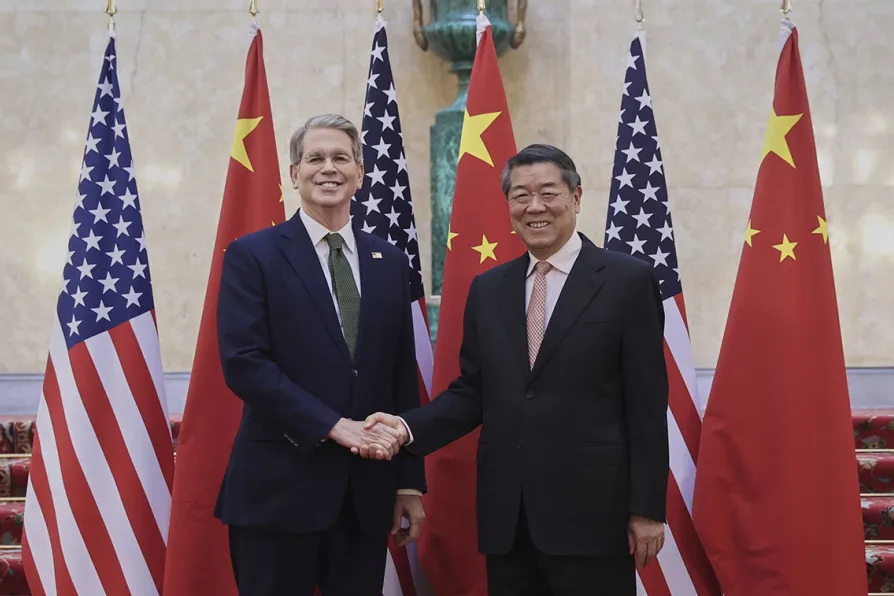
 In this photo released by Xinhua News Agency, Chinese Vice Premier He Lifeng (right) shakes hands with U.S. Treasury Secretary Scott Bessent before their meeting to discuss China-U.S. trade, in London, June 9, 2025. Photo: Li Ying/Xinhua via AP
In this photo released by Xinhua News Agency, Chinese Vice Premier He Lifeng (right) shakes hands with U.S. Treasury Secretary Scott Bessent before their meeting to discuss China-U.S. trade, in London, June 9, 2025. Photo: Li Ying/Xinhua via AP
SENIOR Chinese and US negotiators have agreed on a framework to get their trade negotiations back on track after a series of disputes that threatened to derail them, both sides have said.
China’s vice-commerce minister Li Chenggang said on Tuesday that the Chinese and the US negotiating teams had agreed to a framework on trade after two days of “rational, in-depth and candid” talks and would take those results back to their respective presidents.
“The two sides have, in principle, reached a framework for implementing the consensus reached by the two heads of state during the phone call on June 5 and the consensus reached at the Geneva meeting,” Mr Li told reporters in London after talks that went almost to midnight.
He said: “We hope that the progress we made is capable of increasing trust between China and the US, to further promote stable and sound development of China-US trade and economic relations and also to inject positive energy into world economic development.”
US Commerce Secretary Howard Lutnick told reporters: “First we had to get sort of the negativity out and now we can go forward.”
The talks followed a phone call between Chinese President Xi Jinping and his US counterpart Donald Trump last week to try to calm the waters.
Further details, including any plans for a potential next round of talks, were not immediately available.
Mr Li and Wang Wentao, China’s commerce minister, were part of the delegation led by Vice-Premier He Lifeng. They met with Mr Lutnick, Treasury Secretary Scott Bessent and Trade Representative Jamieson Greer at Lancaster House in central London.
They agreed in Geneva to a 90-day suspension of most of the 100 per cent-plus tariffs they had imposed on each other in an escalating trade war that sparked fears of recession.
The World Bank cut its economic projections for the US on Tuesday because of the rise in trade barriers.
Since the Geneva talks, China and the US have exchanged angry words over advanced semiconductors that power artificial intelligence, visas for Chinese students at US universities and rare earth minerals that are vital to carmakers and other industries.
China, the world’s biggest producer of rare earths, has signalled it may speed up the issue of export licences for the elements.
Beijing, in turn, wants the US to lift restrictions on Chinese access to the technology used to make advanced semiconductors.










